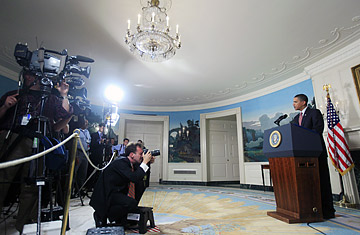
President Barack Obama speaks about Iran to reporters at the White House.
Press Freedom Index 2009
Reporters Without Borders
The Gist:
As if African–American students' test scores and perceptions of the U.S. abroad weren't enough, we can add yet another item to the list of areas of life supposedly improved by the "Obama effect": press freedom. Reporters Without Borders secretary–general Jean–François Julliard credits the President with the U.S.'s jump from 36th place to 20th in this year's eighth annual world press freedom index. Atop the list, which is compiled based on questionnaires completed by hundreds of media experts and journalists worldwide, are a Scandinavian quartet — Denmark, Finland, Norway and Sweden — and Ireland. The bottom three spots are occupied by Turkmenistan (173rd), North Korea (174th) and, for the third year in the row, Eritrea (175th). The report calls these nations "the infernal trio ... where the media are so suppressed they are non–existent." In between those poles, a few other regions made notable moves this year. Though it's long been a pace–setter for journalistic freedom, Europe faltered, while Israel plummeted as officials cracked down on the press in the wake of military operations in the Gaza Strip. And amid increased censorship, surveillance and illegal arrests stemming from a controversial election, Iran plunged to near dead last.
Highlight Reel:
1.The United States is getting freer: "The process of adopting a Shield Law protecting the confidentiality of journalists' sources at the federal level is far from over in the United States (20th) but the judicial authorities are no longer jailing journalists and violating civil liberties in the name of national security as they were in the Bush era. So the U.S. is back in the press freedom top 20, as is appropriate for a country where the press has traditionally played its role as independent watchdog well."
2. But Europe is clamping down: "For the first time since 2002, the press freedom index's top 20 is not quite so European. Only 15 of the 20 leading countries are from the Old Continent, compared with 18 in 2008. Eleven of these 15 countries are European Union members. They include the top three, Denmark, Finland and Ireland. Another E.U. member, Bulgaria, has been falling steadily since it joined in 2007 and is now 68th (against 59th in 2008). This is the lowest ranking of any member of the union."
3. Israel no longer has the freest press in the Middle East: "Israel has begun to use the same methods internally as it does outside its own territory. Reporters Without Borders registered five arrests of journalists, some of them completely illegal, and three cases of imprisonment. The military censorship applied to all the media is also posing a threat to journalists. As regards its extraterritorial actions, Israel was ranked 150th. The toll of the war was very heavy. Around 20 journalists in the Gaza Strip were injured by the Israeli military forces and three were killed while covering the offensive."
4. With five countries in the top 50, Africa has some bright sports — but not enough: "This year confirmed that, in some African countries, democracy rests on solid foundations and respect for freedoms is guaranteed. But in other countries, political crises and instability dealt harsh blows to the work of journalists and news media ... In Zimbabwe (136th), the press seems to be in the process of freeing itself from the regime's vice–like grip. The situation was marred by former journalist Jestina Mukoko's abduction and then imprisonment for many weeks. But hopes have been buoyed by the new government of national unity's announcement in the summer that the BBC and CNN would be allowed to return and that the independent Daily News would be able to resume publishing."
The Lowdown:
By highlighting how war and cultural change can imperil bedrock civil liberties, the report confirms how fleeting press freedom can be, even in countries known for championing a robust press. But it also emphasizes that policy changes can nurse fallen countries back to strength. The ranking also highlights the fierce challenges that journalists continue to face, especially in nations where strife or dictatorships take a toll on their ability to function freely.
The Verdict: Skim
